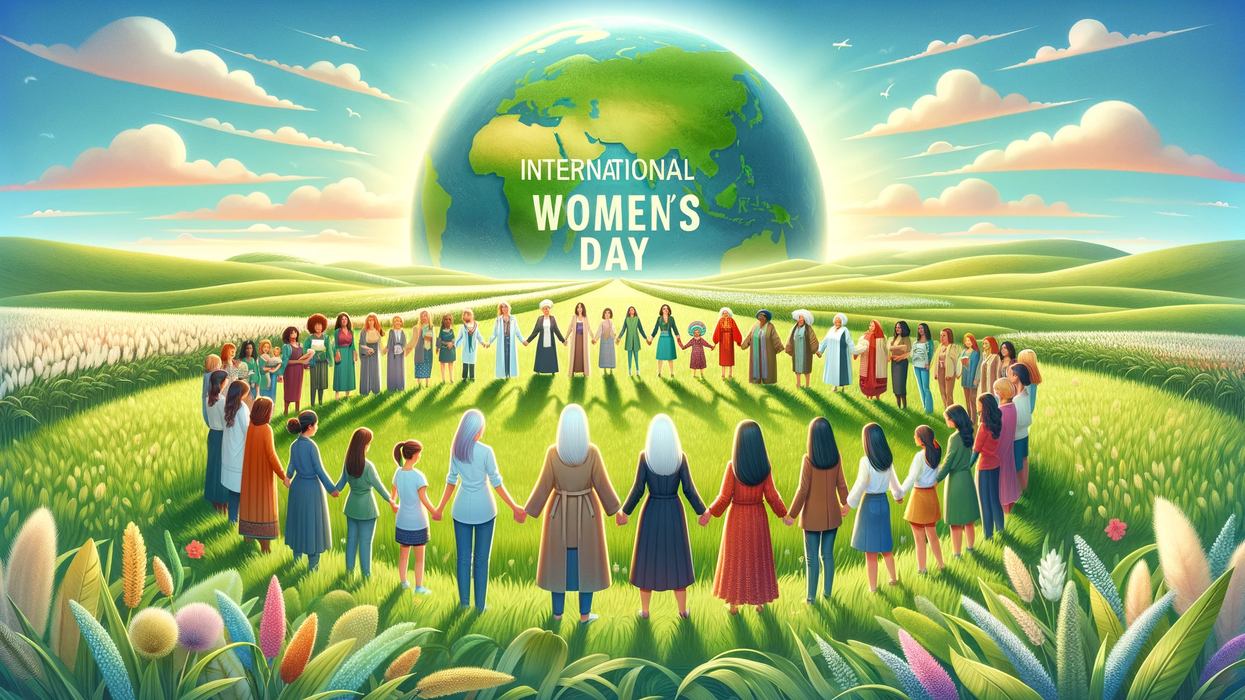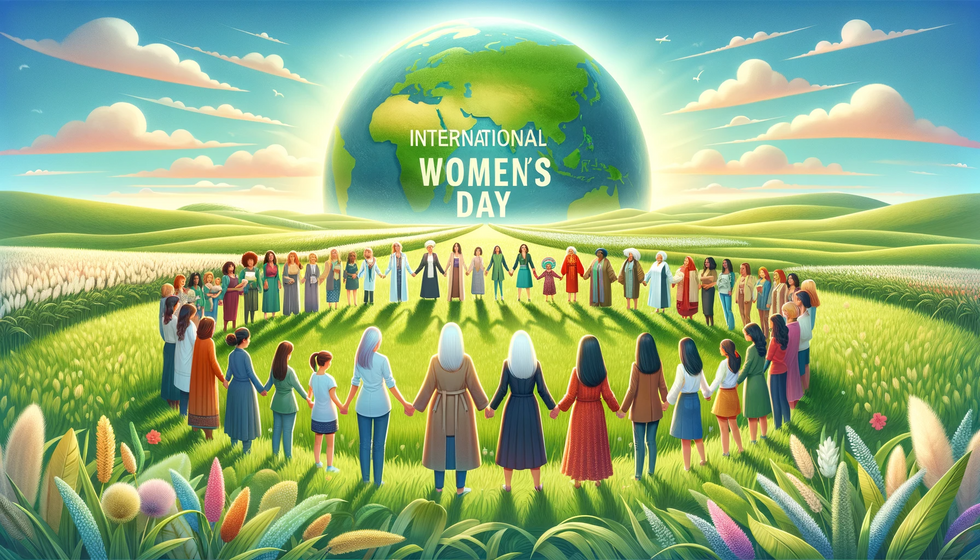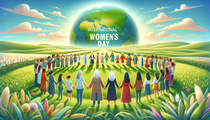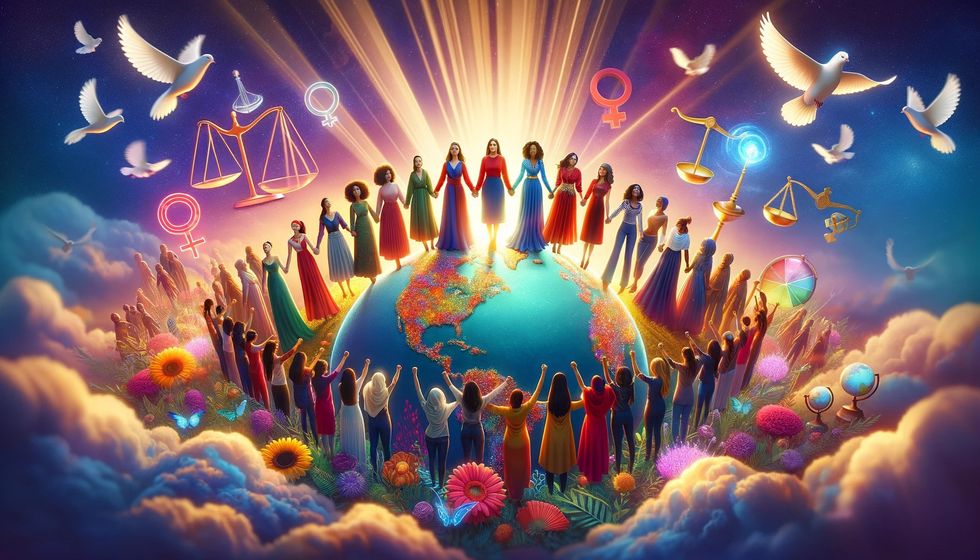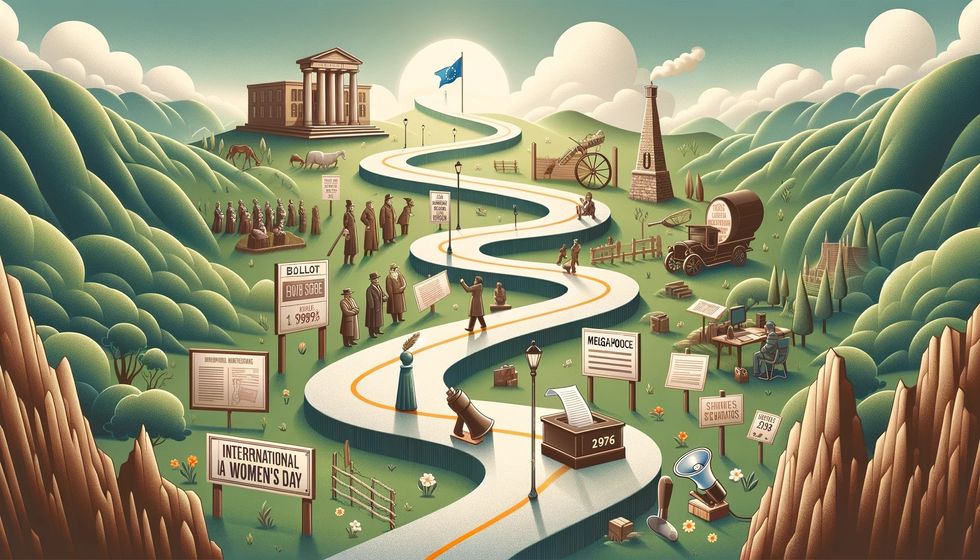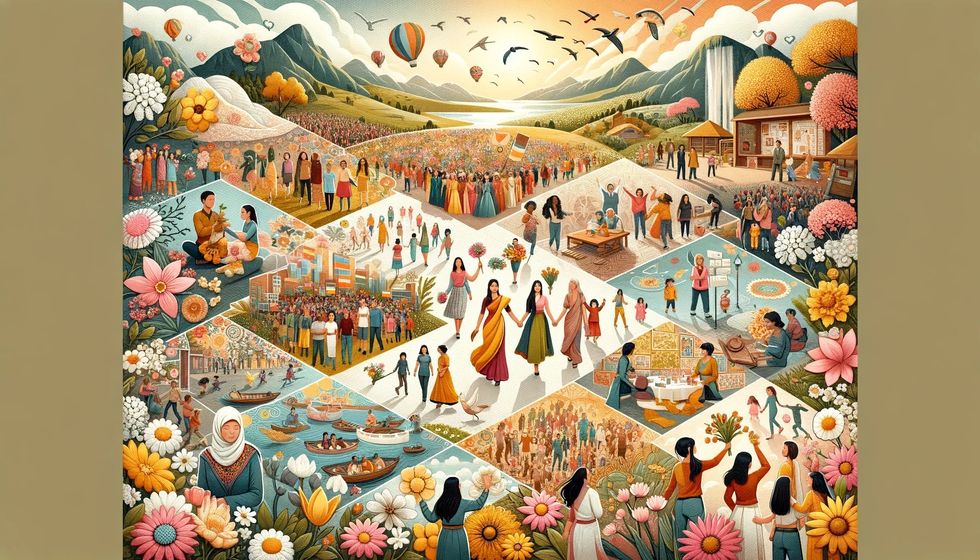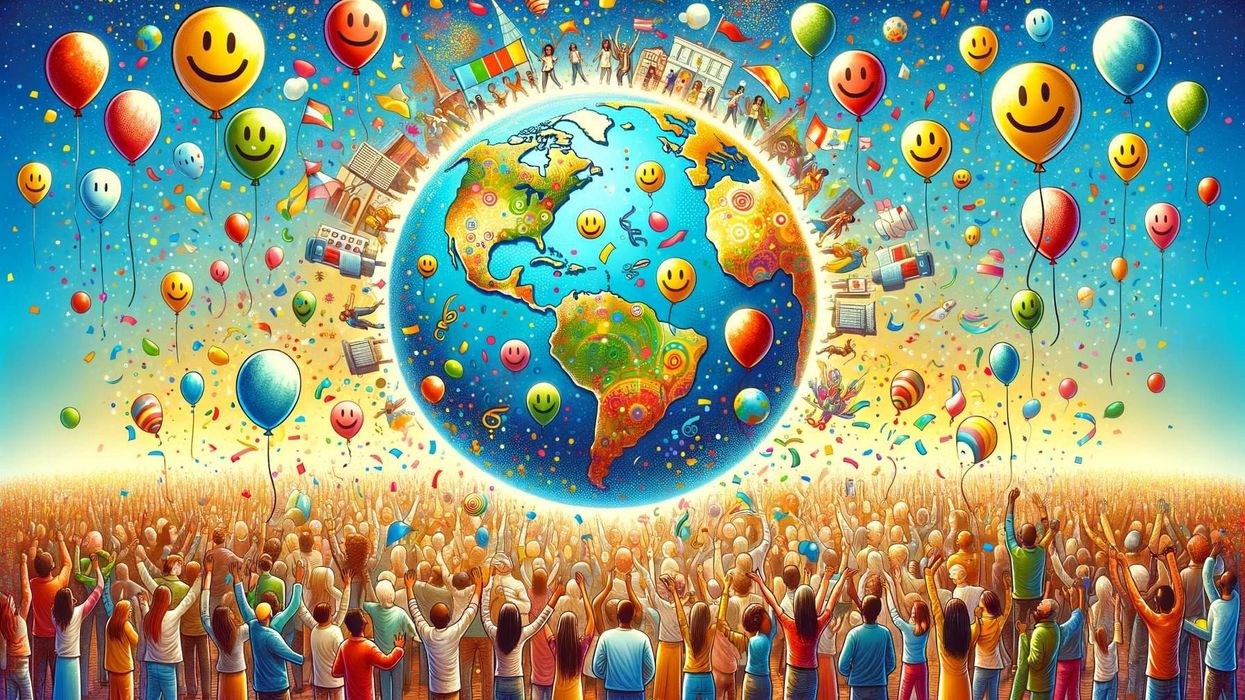March 8, 2024
Location: Worldwide
International Women's Day (IWD) is a worldwide event that celebrates women's many contributions to society and calls for fair treatment for everyone.
This tradition started in the bustling 20th century with people all over wanting change and new ideas stirring up. In 1908, women in New York City made their voices heard by marching for better working conditions and the right to vote.
The next year, the first National Woman's Day was marked in the U.S. on February 28, thanks to the Socialist Party of America. This special day was celebrated by women every year on the last Sunday of February until 1913.
A woman named Clara Zetkin, from Germany's Social Democratic Party, had a big idea at a big meeting for women workers in Copenhagen in 1910. She proposed a day that would be celebrated all over the world to push for what women need and deserve.
Women from many different places, including the first women lawmakers from Finland, all agreed with Zetkin's plan.
International Women's Day doesn't belong to just one country or group, it's for everyone, everywhere. It's marked by gatherings, from meetings to business events, that spark conversations about women's rights.
Where is International Women's Day celebrated?

International Women's Day (IWD) is celebrated globally, with events organized in numerous countries around the world to honor women's achievements and advocate for greater gender equality. These events range from rallies, conferences, and business events to more localized gatherings and celebrations.
Who is International Women's Day celebrated by?
A diverse range of participants including individuals, organizations, governments, and educational institutions worldwide observe International Women's Day. It is a day when people from different backgrounds unite to celebrate the progress made towards gender equality and to advocate for further advancements.
When Did International Women's Day First Start?
The earliest reported Women's Day event was organized by the Socialist Party of America in New York City on February 28, 1909. This event inspired the establishment of an International Women's Day during the second International Conference of Working Women in Copenhagen in 1910, where Clara Zetkin proposed the idea.
The first International Women's Day was then celebrated on March 19, 1911, in several European countries.
Who started International Women's Day?
International Women's Day has its origins in the socialist and labor movements. The Socialist Party of America organized the first observance in the United States.
The idea to expand this into an International Women's Day was proposed by Clara Zetkin, a German Marxist theorist and women's rights activist, during the International Socialist Women's Conference in 1910. The proposal was unanimously approved by over 100 women from 17 countries.
History And Timeline

This timeline highlights the significant milestones in the history of International Women's Day, showcasing the global effort to achieve gender equality and empower women worldwide.
Timeline Item 1
Date: 1909
Heading: First National Woman's Day
Summary: The first National Woman's Day was observed across the United States on February 28, 1909, following a declaration by the Socialist Party of America. This day was in honor of the 1908 garment workers' strike in New York, where women protested against working conditions.
Timeline Item 2
Date: 1910
Heading: International Women's Day Proposal
Summary: At the second International Conference of Working Women held in Copenhagen, Clara Zetkin, a women's rights activist, and politician, proposed the idea of an International Women's Day to promote equal rights, including suffrage, for women. Over 100 women from 17 countries endorsed the proposal.
Timeline Item 3
Date: 1911
Heading: First International Women's Day
Summary: The first International Women's Day was celebrated on March 19, 1911, in Austria, Denmark, Germany, and Switzerland, with more than one million people attending rallies to demand women's rights to work, vote, be trained, hold public office, and end discrimination.
Timeline Item 4
Date: 1913-1914
Heading: Change of Date
Summary: In Russia, women celebrated their first International Women's Day on the last Sunday of February in 1913. Following discussions, it was decided that International Women's Day would be recognized every year on March 8, aligning with the Gregorian calendar.
Timeline Item 5
Date: 1917
Heading: 'Bread and Peace' Strike
Summary: On February 23 (Julian calendar), Russian women demanded 'Bread and Peace' amid war losses. Their protest led to the Czar's abdication and a temporary government granting women voting rights. March 8 (Gregorian calendar) marks this historic event, now celebrated as International Women's Day.
Timeline Item 6
Date: 1975
Heading: UN Celebrates International Women's Day
Summary: During International Women's Year, the United Nations began celebrating International Women's Day on March 8, officially recognizing the day to promote women's rights and world peace.
Timeline Item 7
Date: 1977
Heading: General Assembly Adoption
Summary: The United Nations General Assembly decided that there should be a special day called United Nations Day for Women's Rights and International Peace, for countries in the group to celebrate together.
Timeline Item 8
Date: 1996
Heading: International Women's Day Theme.
Summary: The United Nations kicked off the tradition of International Women's Day by introducing its first theme, 'Celebrating the Past, Planning for the Future'. Now, every year has a different theme to highlight what the day is all about.
Timeline Item 9
Date: 2011
Heading: 100th Anniversary
Summary: The 100th anniversary of International Women's Day was celebrated, with President Barack Obama declaring March as 'Women's History Month' in the United States.
Timeline Item 10
Date: 2024
Heading: Inspire Inclusion
Summary: The theme for International Women's Day 2024 is 'Inspire Inclusion', focusing on collective action and shared ownership for driving gender equality.
Traditions And Customs

International Women's Day is rich with historical and national traditions, including public performances, talks, rallies, and networking events that celebrate women and advocate for continued efforts to achieve gender equality. Many people also wear purple ribbons to show support for women's equality.
Ways To Observe Or Celebrate International Women's Day
Engage with organizations that advance gender equality, participate in discussions, educate yourself and others about women's rights, and support women-led businesses. Raise awareness on social media using the International Women's Day annual campaign theme to help accelerate progress.
International Women's Day Facts And Stats

- The United Nations officially recognized International Women's Day in 1975.
- The theme for IWD changes annually, focusing on different aspects of women's rights and gender equality.
- IWD events are held in more than 100 countries across the globe.
- The first International Women's Day was celebrated on March 19, 1911, in Austria, Denmark, Germany, and Switzerland, and the date was later moved to March 8, in 1914.
International Women's Day FAQs
What is the history behind International Women's Day?
International Women's Day (IWD) is marked globally on March 8 and has been since the early 20th century, emerging from a period of rapid growth and social changes. The first observance was National Woman's Day in 1909 by the Socialist Party of America, honoring the International Ladies' Garment Workers' Union strike.
In 1910, an international conference of women socialists proposed an annual Women's Day, which took hold after becoming an official holiday in Soviet Russia following women's suffrage win in 1917. Initially celebrated by socialist and communist countries, it was later embraced by the global feminist movement in the '60s and officially recognized by the United Nations in 1975.
Why is gender-responsive budgeting important for International Women's Day?
Gender-responsive budgeting is important for International Women's Day because it considers both women's and men's needs when planning how to spend money. This helps reduce unfairness between men and women by putting money into programs that encourage equality and help women to have the same opportunities.
It's a way to make sure women's rights are protected and everyone is treated equally, which is what International Women's Day is all about. Plus, it helps achieve one of the big global goals, which aims to make life better for women and girls everywhere.
How can International Women's Day help to empower women?
International Women's Day helps give power to women by spreading the word about their successes and the obstacles they still face. It's a day to push for equal rights and opportunities, which help women grow stronger.
By sharing stories of amazing women and their work, it encourages others too. The day gets everyone involved, from teaching others to supporting good causes that help women. It shows that when we all work together, we can make big steps towards making things equal.
What is the significance of International Women's Day colors?
The colors for International Women's Day are purple, green, and white. Purple stands for fairness and respect, green means hope, and white is for goodness. These colors started with a group in the UK called the Women's Social and Political Union in 1908.
How is International Women's Day celebrated around the world?
International Women's Day is a big deal all over the world, with lots of events like parties, meetings, award shows, art shows, parades, and races. People also use this day to spread the word about treating everyone equally, regardless of their gender.
They do this through special events and by talking about it online. In some places, this day is even a holiday where people give flowers and little presents to celebrate the women in their lives.
What are some challenges to gender equality highlighted on International Women's Day?
On International Women's Day, we talk about important problems like the fact that women often get paid less than men for the same work, don't have as many chances to lead, and can face violence just because they are women.
It's also a day to think about how girls sometimes don't get the same chances to learn or stay healthy and how women and girls usually have to do more chores at home without getting paid.
This day helps us look for ways to fix these issues.
How does International Women's Day contribute to the Sustainable Development Goals (SDGs)?
International Women's Day helps us work towards a big goal: making sure women and girls are treated fairly and can do anything they want in life. The things people do on this day, like special events and campaigns, support this goal.
They focus on stopping unfair treatment and harm to women, making sure women can be leaders and make important decisions, and appreciating the unpaid housework and care they often provide.
Follow On Social Media
Twitter Hashtag: #InternationalWomensDay #IWD2024 #ChooseToChallenge #InspireInclusion #InvestInWomen #EachforEqual.
Instagram Hashtag: #InternationalWomensDay #IWD2024 #EmpowerHer #WomensHistoryMonth #KnowYourWorthLadies #SHEEO #Girlpreneur #EachforEqual #WomenEmpowerment #GirlPower #Feminism #InspireInclusion.
When is this day celebrated?
03/08/2024, Friday
03/08/2025, Saturday
03/08/2026, Sunday
03/08/2027, Monday
03/08/2028, Wednesday
International Women's Day serves not only as a day to celebrate the extraordinary roles women play in our lives and societies but also as a day of advocacy for accelerating global efforts towards gender equality. By recognizing achievements, addressing challenges, and focusing on empowering women, IWD helps to foster a more inclusive world.
Related Articles Around the Web

